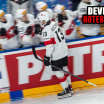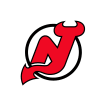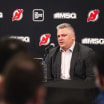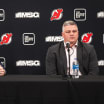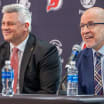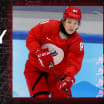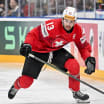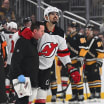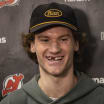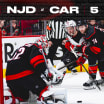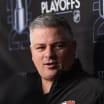"The best New Jersey coach in history," ex-Devils center Bobby Holik told me, "was Jacques Lemaire. Nobody was in second place."
Hey, the man is entitled to his opinion and, no doubt, he'll get a ton of objections, because there's a wide field from which to choose.
Just off the top of my head, you can start with America's 1980 Olympic Gold Medal hero Herb Brooks who spent a season behind the Garden Staters bench.
How about Larry Robinson who piloted the 2000 Cup-winners over Dallas or, for that matter, Pat Burns who sipped championship champagne with the boys in 2003 after knocking off Anaheim in seven games.
DEVILS OVER THE DECADES SPECIAL: Devils Cavalcade of Coaches
Stan Fischler recaps all the bench bosses for the Devils since the franchise arrived in New Jersey
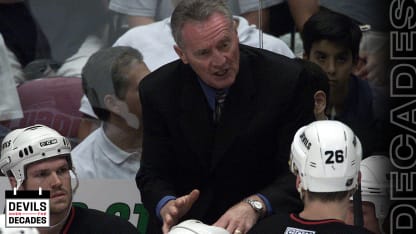
By
Stan Fischler
Special to NHL.com
PREVIOUS ARTICLES
PAST CHAPTERS
Ch. 1 - The Birth of Hockey in Jersey
Ch. 2 - How it all Began
Ch. 3 - The First Devils Roster
Ch. 4 - The Milestone First Season
Ch. 5 - The Great Gretzky Uproar
Ch. 6 - Getting Even with Gretzky
Ch. 7 - A New Coach, A New Era
Ch. 8 - The Birth of a Rivalry
Ch. 9 - A Showdown Season
Ch. 10 - Carpenter's Last Stand
Ch. 11 - Enter Lou, Enter Changes
Ch. 12 - Exit Carpenter, Enter Schoenfeld
Ch. 13 - Devils Over the Decades
Ch. 14 - The Hot Homestretch
Ch. 15 - Showdown with the Rangers
Ch. 16 - A Classic Win
Ch. 17 - Playoff Bound - Almost!
Ch. 18 - First Playoff Berth
Ch. 19 - First Playoff Win
Ch. 20 - Washing the Capitals
Ch. 21 - Meadowlands Melodrama
Ch. 22 - Goodbye Caps, Hello Boston
Ch. 23 - Taking on the Bruins
Ch. 24 - Yellow Sunday in East Rutherford
Ch. 25 - Close but no Cigar
Ch. 26 - Best Devils Quotations
Ch. 27 - Build-Up to a Letdown
Ch. 28 - The Russian Invasion of New Jersey
Ch. 29 - Slava and Sergei Arrive
Ch. 30 - Evolution of the Russians
Ch. 31 - 1990s Playoffs or Bust
Ch. 32 - Adding Muscle on top of Muscle
Ch. 33 - Coaching Change; Cunnif to McVie
Ch. 34 - McVie for Victory
Ch. 35 - Bring on the Penguins
Ch. 36 - Chasing the Elusive Penguins
Ch. 37 - Building a Champion - Get Stevens!
Ch. 38 - Explosive Devils of 1991-92
Ch. 39 - Breezing Along with the Breeze
STANLEY CUP WINS
2003 - Devils Stanley Cup Run
2000 - Lucky Seven
2000 - Winning in Dallas
1995 - Built off a Lockout, Cup Champs
SPECIAL EDITIONS
Devils Cavalcade of Coaches
Coaches Sidebar
Best Devils Quotations
WHAT'S NEXT
A new Devils Over the Decades article will be published every Tuesday, Friday and Sunday morning. Check NewJerseyDevils.com to continue reading!
"When you talk about coaches," Devils broadcaster Glenn (Chico) Resch explains, "there are so many factors to consider. That includes talent. Some of the best coaches in history failed when they didn't have the horses."
The best example of that would be the pre-East Rutherford NHL franchises that eventually became the New Jersey Devils.
First came the Kansas City Scouts which entered the NHL for the 1974-75 season along with the Washington Capitals.
The original Scouts coach was Armand (Bep) Guidolin whose other claim to fame was his being the youngest player in NHL history. During World War II Bep signed on with the Boston Bruins at the tender age of sixteen.
"Bep was a good coach," said his cousin Aldo Guidolin, who later would be behind the Colorado Rockies bench, "but that Scouts team he had simply didn't have the talent."
What K.C. did have was impatient owners. After Bep Guidolin was fired, his successors included former Detroit Red Wings Hall of Famer Sid Abel, followed closely by ex-NHL defenseman Eddie Bush.
Before leaving Kansas City's Kemper Arena for the last time, Abel's sayonara understatement went like this: "Coaching here was tough. We weren't exactly overloaded with stars."
After two dismal seasons in the Missouri metropolis, the K.C. franchise was moved to Denver and re-christened the Colorado Rockies.
Under coach Johnny Wilson, the Rockies finished last in the Smythe Division (20-46-14), After his one season, (1976-77) Wilson got the hook in favor of long-time minor league defenseman and coach Pat Kelly.
Amazingly, Kelly spurred the Rockies into the 1977-1978 playoffs; mostly because the Smythe Division that year was weaker than a newborn puppy.
Still, Kelly's club gave Philadelphia a good challenge before bowing out.
No such luck a year later and no more coach Kelly. Pat got the pink slip when Bep Guidolin;s kid-cousin, Aldo Guidolin, got the gig. No question, Aldo had the goods as a mentor but his roster was rotten.
"The talent just wasn't there," he explained. "The forwards under-produced, our goaltending was weak and our best defenseman was Barry Beck; still a kid learning the ropes. Too slowly to suit me."
After Aldo exited Stage Left, from Stage Right, ownership delivered a headliner -- Don (Grapes) Cherry who previously had gained headlines leading the Boston Bruins between wisecracks and battles with his boss Harry Sinden.
Cherry's lone campaign in Denver was the 1979-80 season and it was a huge success -- in the laugh department. Grapes' wit, wisdom and willingness to talk to everyone charmed the fans and the media. Plus, he was candid to a fault.
"I have the worst goalie in hockey," he said of the Swede Hardy Astrom. "My other two -- Bill McKenzie and Bill Oleschuck -- are no bargains either. Our goalie problems aren't big; they are colossal."
Cherry's honesty won him a ticket out of Denver. "We need a coach who can motivate our young players," said co-owner Armand Pohan who promptly signed Bill MacMillan for the 1980-81 campaign.
Mac was no bargain (22-45-13) either, missing the playoffs but still managing some front office magic. Instead of getting the hook for a job un-well done, Billy nailed the general manager role while Bert Marshall ran the bench.
Whoa! Everyone loved Bert as a tennis player but his club was so far under .500 even The Hockey News couldn't find it. Good-bye, Bert, hello Marshall Johnston.
By that time, Rockies ownership wondered whether any coach extant could turn Colorado into a winner. Rather than wait for an affirmative answer bosses exited themselves and eventually Dr. John J. McMullen purchased the team.
After moving his prize to the big, new arena in East Rutherford, Doc Mac decided that Billy Mac should have the dual role of g.m. and coach which is the way it was for the Devils maiden season in The Meadowlands.
But as New York Yankees icon and Devils fan Yogi Berra said, "It's deja-vu all over again." MacMillan couldn't cut it just as he failed in Denver. The chute was pulled; out went MacMillan and in came Tom McVie on November 22, 1983.
Considered by many in the media as "The Poor Man's Don Cherry," the throaty McVie brought a ton of coaching experience with him, most recently from Maine in the American Hockey League -- along with many witticisms.
McVie: "I know it's gonna be tough at times. I like to quote Waylon Jennings' song that things can't always be what you want them to be. That 'Sometimes it's Heaven. Sometimes it's Hell. And sometimes I don't even know.'"
A year of McVie hardly was enough to craft a winner but McMullen decided a change of staff was in order. As a result Tom went out the revolving door and Doug Carpenter was minted new coach.
If nothing else, the Redhead oozed intensity and was pretty darn smart as well. He also had plenty of intestinal fortitude as he brushed off a sarcastic New York Post headline: DISMAL DEVILS GOING NOWHERE!
In a hockey sense, the "where" in "nowhere" is a place which the Devils managed never to invade -- the playoffs. And sadly for Carpenter, he struck out for two straight seasons, yet management persisted in its patience.
That element -- patience -- ran out when Lou Lamoriello arrived in 1987 as the franchise's new major domo. Carefully, Lou studied his acquired coach through October and November.
There were positive signs, to be sure, but as the holiday season was about to arrive the Devils visited Madison Square Garden on December 16th, 1987 for what would be the ultimate Carpenter litmus test. Beat the Blueshirts or else!
It was no contest: 9-3, New York. Lamoriello began his quest for a replacement, Larrupin' Lou required a bit more than a month -- January 26, 1988 to be exact -- until he christened Jim Schoenfeld.
"A change in our staff was necessary at this time to get our team into the playoffs," The Boss explained.
No further explanation was necessary.
If nothing else, the newest red-thatched coach had charisma bubbling out of every pore. But there was something else. Call it "The Knack," call it what you will but The Schoenfeld Effect spurred the Devils to a playoff run.
For most of the homestretch, it appeared that Garden State fans would suffer through another dismal too-little-too-late scenario. But this time there was a happy ending.
On the final night of the season -- on a John MacLean overtime goal in Chicago -- the Devils beat out the Blueshirts for the final playoff spot.
Better still, Schony guided them past the first place Islanders, then the Washington Capitals before his skaters were ousted in a thrilling seven-game, third-round series with Boston.
It would have been tough for Coach Jim to top that miracle run; and he didn't. Once New Jersey imported the Russians, Slava Fetisov and Alexei Kasatonov, problems surfaced; mostly between Jim and Slava.
Lamoriello resolved the difference by firing Schoenfeld. John Cunniff, Gentleman Jim's assistant coach, now was the head counselor.
Low-key but consummately cerebral, the New Englander put the Devils back on track and into. the playoffs.
Cunniff was good, to be sure, but not good enough. While he did hustle his club into the post-season, problems developed between coach and 1988 playoff hero-goalie Sean Burke.
The guillotine for Cunniff was self-applied when -- naturally after a loss -- he said his players, "Have no intensity; no will to win and no character."
Lou phoned Tom McVie and gifted the gravel-voiced orator with his second Devils coaching job. "I'll handle these guys," Tom Terrific assured, "and get them into the playoffs."
That he did. New Jersey went up against the Patrick Division champion Penguins and actually stunned the hockey world by taking a three games to two lead. Alas, they lost the next pair but exited with their heads held high.
What's more, McVie held on to his job but Lou added a pair of significant aides. Herb Brooks was named head coach of New Jersey's AHL farm team in Utica while irascible Robbie Ftorek would assist Tom behind the bench.
The formula succeeded in many ways; most of all another playoff berth was deposited in the bank. This time the post-season adventure peaked with yet another epic "Battle Of the Hudson." Devils vs. Rangers was now a RIVALRY.
All things considered, McVie did well. His scrapiron Devils employed no less than four goalies -- Chris Terreri, Craig Billington, Chad Erickson and peach-faced rookie Martin Brodeur -- and still managed to thrive into the playoffs.
Heavily-favored, the consummately disliked Rangers had won the Presidents' Trophy for most regular season points (105) -- seven points better than the rest of the league. New York's ace, Mark Messier, scored 35 goals and 107 points.
Still, McVie's marauders rang up a two games to one lead. But the Messier-Brian Leetch combine proved too much and when it came down to Game Seven, the New Yorkers offense dominated and the Blueshirts won, 8-4.
The Devils not only lost the series; they lost another coach. Indomitable McVie did not possess enough of what Lamoriello believed that the team needed. Lou suggested that more of a European style would do the trick.
"With the type of talent our team possesses, we find that Herb Brooks is best suited to take our team to the top," Lou asserted while thanking McVie very much for a job well done. ("Tom served the organization well for a long time.")
As panaceas go, Brooks was more like a baby aspirin for a migraine. Sure the 1980 Olympic hero got his club in the playoffs but the Devils pulled up the rear in the Patrick Division and that was a portent of things to come.
It was Herb's misfortune to face the Stanley Cup champion Penguins in the opening round. Essentially it was over and out in five games. Ditto for Brooks; over and out!
Never hesitant to pull a surprise out of his valise, Lamoriello convened a press conference in late June 1993. Lou's secret choice was hermetically-sealed and when the curtain finally opened, there he was, Voila! Jacques Lemaire.
Lou: "Jacques brings impeccable credentials to the Devils and they are recognized throughout the entire NHL. The assets he possesses will leave no doubt as to his level of authority in our dressing room."
So it was. Lemaire brilliantly guided the Devils through a heart-throbbing seven-game classic playoff with the Rangers in 1994 and although New Jersey lost, his rip-roaring' club had set a new standard of Devils hockey excellence.
A year later Lemaire hoisted the Stanley Cup. He suffered some downs and ups later in his Garden State coaching career but, when all was said and done, Jacques ranked at the very top of Lou's list super-competent leaders of men.
"Jacques brought the Devils to rarified ice," said Tim Sullivan of The Associated Press. "He proved that by beating Detroit, four-straight in the Cup Final."
By the end of the 1997-98 season, Lemaire was exhausted with coaching and was replaced by Robbie Ftorek. When someone asked Jacques if he'd like to return to his native Montreal and coach the Canadiens, he laughed out loud.
"No matter what Montreal would offer," Jacques-Be-Nimble explained, "my sanity, my health, and my life are worth more to me."
It was impossible for Ftorek to follow Lemaire's act right through most of the 1999-80 season and -- in many valuable ways -- it appeared as if he had the talent to win the 2000 Cup.
But then Robbie blew it; or threw its as the case may have been.
In a game at Detroit, his forward Jay Pandolfo was injured in a collision and no penalty was called. Furious, the head coach picked up a heavy wooden bench and tossed it on the ice. That blatant act of insubordination cost Robbie his gig.
It was a stunner to be sure but, as any hockey player (quoting William Shakespeare) can tell you, sweet are the uses of adversity.
"When you're in the moment," said Ken Daneyko, "it's tough to see the big picture. It's tough to believe the tough times will eventually lead to good times."
But they did. Larry Robinson was rushed in to fill the breach and did so with a smile on his face and a lilt in his heart. Navigating his invigorated club through the first three playoff rounds, Loveable Larry then encountered roiled waters.
Talent-filled Dallas confronted New Jersey in the 2000 Cup Final. Robbie and his club looked sharp in practices but even Larry, on the ice with his team felt the tension.
Robinson: "There were times when I was squeezing the stick so hard (directing scrimmages) that maple syrup came out."
As it happened, Jason Arnott came out of nowhere to zing an accurate Patrick Elias' pass into the Stars net and Robbie reached his acme as a champion coach. Beating the talented Stars was something else for the Big Guy.
"Despite all the Cups I won as a player," Larry concluded, "winning the Cup as coach was my greatest day."
A year later he took his club to a Game Seven Final vs. Colorado and got beaten. Something was missing in Robbie's work in 2001-2002. Just past mid-season he was replaced by the underrated Kevin Constantine.
Revived, the Devils went 20-8-2, finishing third in the Atlantic Division but exited the playoffs in the first round. Once again, Lou went to the well and hired highly-acclaimed coaching vet, Pat Burns, to start 2002-2003.
Super move!
Slow-Burn Burns sparked New Jersey into the post-season where the club reached its highest gear. After visiting a boat show between games, Pat opined "The longer we go in the playoffs, the bigger the boat."
They went all the way, overcoming Anaheim, 3-0, at The Meadowlands to capture a third Cup for the franchise. In time, bouts with colon and liver cancer forced an end to Pat's coaching career in 2005.
For the following season, the combo Lamoriello and Robinson worked the bench. The double-dip got them into the playoffs where they lost in the Conference Semi-Finals.
Once more, Lamoriello chose change and now the head man would be Claude Julien. To the untrained eye, Julien's fate made little to no sense at all. His club was finishing first in the Atlantic Division and second in the East.
But Lou sensed a problem -- some believe it was unrest within the clubhouse -- and with only three games remaining in the regular season Lamoriello fired Julien.
Instead of finding an interim mentor, Lou chose himself to chase a fourth Cup and orchestrated a playoff run to the Conference semi-finals and out!
From 2007-2008 to the present, the team coaches were alternately disappointing under Brent Sutter (2007-2009), and still more disappointing with Jacques Lemaire's return in 2009-2010.
Still, the coaching situation really didn't hit bottom until Lou chose to gamble with his onetime scoring ace, To be kind, Johnny Mac's tenure in 2010-2011 did not work to his nor the Devils advantage.
After 33 games, MacLean's record was a sub-dismal 9-22-2, inspiring Lou to fire Mac and bring Lemaire back to cure the ills. Doc Jacques did wonders, turning NJ into one of the NHL's hottest teams, but it wasn't quite enough.
Once Lemaire retired -- this time for good -- Lou hired Peter DeBoer for 2011-2012. To call the move fortuitous would be an understatement. Phenomenal is better.
After amassing 102 regular season points, DeBoer's demons overwhelmed playoff opposition -- especially the Rangers -- before clashing with Los Angeles in the Final.
The Devils fought valiantly before being subdued in six games. DeBoer's coaching throughout -- especially how he out-maneuvered John Tortorella in the Rangers series -- was superior but it was his last hurrah in
Newark
.
By, the 2014-2015 season, Peter's skaters were plodding along with a 12-17-7 record when he was fired on December 26, 2014. Lamoriello's last Devils move was to install dual coaches -- Adam Oates and Scott Stevens.
Finally leaving the Devils, Lou was replaced as general manager by Ray Shero. The new headmaster selected John Hynes as head coach with Alain Nasreddine as one of John's aides.
Candid, thoughtful and occasionally emotional, Hynes appeared to do decently enough with the horses he had. But either the horses or the coach were not moving quickly enough to suit the man who hired Hynes.
Disappointed with John's work, Shero fired him last December 3rd and just over a month later Ray, himself, was dismissed. Nasreddine remained on as interim coach until the NHL's "Pause" halted operations for the duration.
If anything can be learned from the Devils Coaching Cavalcade -- apart from the inalienable fact that coach's are hired to be fired -- it is this line from Tom McVie:
"I can be out of town in 20 minutes, 30 if I have stuff at the cleaners!"

